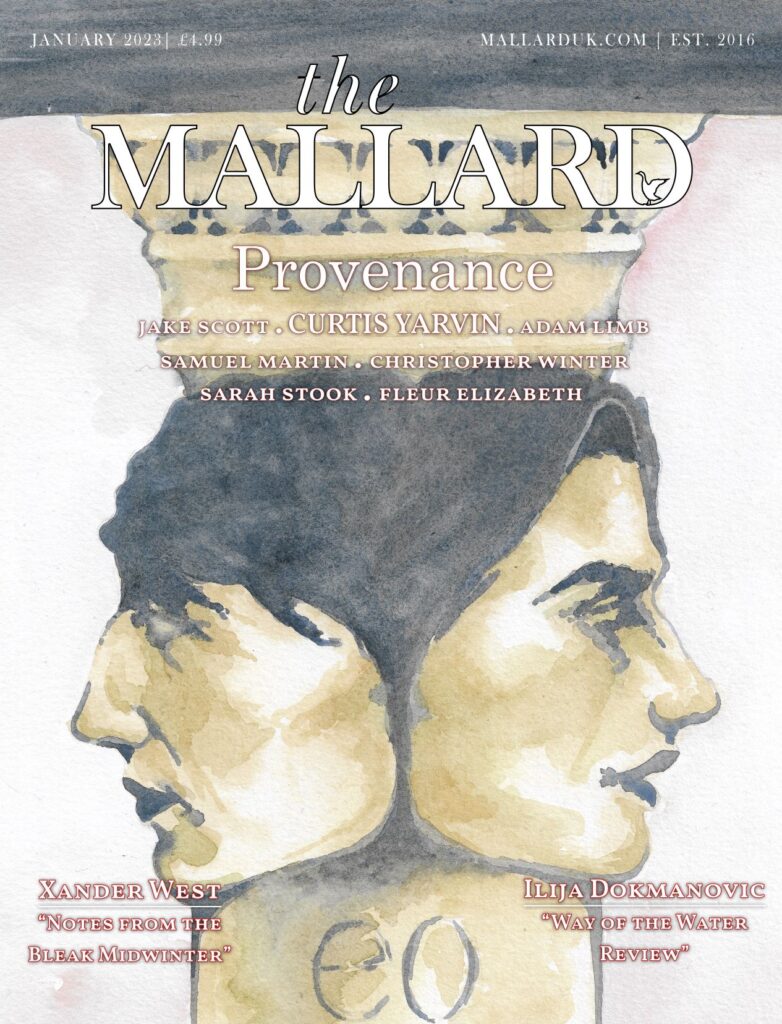In short, the year started badly but was peppered with good moments. By mid-2022 it was going excellently, and I thought I was finally past the worst of what this year could throw at me. My hubris was rewarded with some of the worst few months of my life so far. I know that, in the grand scheme of things, I should be thankful for all that I have, and I certainly recognise that I have it much better than most people. It helps to remember that, but it doesn’t change how I felt and acted at the time.
I suppose that that is the nature of life and hindsight. At the time, these moments seemed to mean everything. They either crush your soul and spirit or bring you to the highest heights. I think that this sentiment is expressed quite well in the ‘it’s over/we’re back’ memes that have propagated themselves across my twitter timeline for the past few years. We outright refuse to recognise our own mundane victories and losses, and instead focus on the peaks and troughs – this is natural of course, we would go completely insane otherwise.
I don’t think it is bad to allow these experiences to hit you. Part of the human experience is to be hit by these ups and downs. It is the dwelling on these events that becomes a problem. Holding on to fading hurt and fleeting success instead of moving on in some sort of twisted nostalgia for our best and worst moments can lead us down a very dark and dangerous road. It makes us forget who we are and who we can be. Our lessons learnt, we should embrace the change and simply move on. It is in these moments that we grow and mature as people, and become a better version of ourselves.
For me personally, this year has been an absolute rollercoaster of highs and lows, and that has been very hard to deal with. Things seem to be better now, however, and I am filled with enthusiasm for what the new year can bring me. I think that 2023 will be an amazing time for personal growth and development. I still have a lot of weight to lose, but I am steadfast in my determination to see it through this year. Coming to terms with my situation and state of mind will not be easy, but life is not supposed to be easy. Nothing worth doing is easy.

This is an excerpt from “Provenance”. To continue reading, visit The Mallard’s Shopify.
You Might also like
-
One Step Forward, Two Steps Back
Yesterday, Rishi Sunak announced his intention to cut net migration by 300,000, calling it “the biggest ever cut in net migration” two weeks after the ONS revealed net migration had increased to an unprecedented 745,000, revised up from 672,000.
Despite the claims made by politicians and the press, this announcement isn’t worth getting excited over. I needn’t re-establish the Tories’ abysmal track-record on immigration, partially because it is common knowledge (we’ll get it into the tens of thousands this time, we promise!), but mainly because their policy will prove fraudulent and destructive, even if carried out to the fullest extent.
If the government succeeded in bringing down net migration to their stated target, it would still be far higher than anything experienced before Covid. Up until recently, net migration sat at around 250,000, peaking at over 300,000. As a net figure, these figures included upwards of 500,000 arrivals each year since the early noughties, continuing a rapid increase in arrivals since the late 1990s.
Now-infamous research by Dr David Coleman showed White British people would be a minority in the UK by 2066 if immigration continued at such levels. Coleman’s forecast was published in 2013. Ten years later, net migration has more than doubled with 450,000 every year being treated as a radical reduction by politicians and the press. Of course, it matters not whether such circumstances arrive sooner or later, it would be essentially immoral and consequentially destructive for our society, as we can infer from the past few years alone.
In many ways, what the government is doing is more subversive than not doing anything at all. It is treating pre-Covid net migration as the natural benchmark, implying anything more demanding is a form of deranged and impractical extremism, a notion which couldn’t be further from the truth. Keep in mind: this country saw the rise and fall of the BNP and UKIP, a referendum on EU membership, the triumph of the Brexit Party, and a landslide for the Conservatives before the post-2020 surge in arrivals, all of which were motivated by a fraction of what the “FAR RIGHT” (!!!) Tory government are proposing.
The government’s new policy has no intention of cutting the number of foreign students, graduate worker visas or the skilled workers list. NGOs remain generously funded, no laws or treaties are abolished or amended, whilst social care and graduate visas, along with dodgy postgrad courses at immigration-dependant universities, have been left practically untouched. Typical of the Tories, they can only address immigration in technical terms, seeing at is possibly economically inefficient and occassionally unfair, rather than a matter of sociopolitical importance.
Rather, it would scrap the shortage occupation list, which companies can use to pay foreign workers 20 per cent below the going rate for jobs with so-called “skills shortages”, ban foreign care workers and non-postgraduate students bringing dependants, increase the salary required for skilled foreign workers to get a visa to £38,700, and increase in the health surcharge to £1,035. Simply put, the government’s radical policy to regulate mass migration will not address several of the main causes behind mass migration.
Just like the “biggest tax cut in history”, the “biggest cut to net migration in history” is an admission of defeat disguised as a victory chant. Despite talk of reform, Westminster’s high-immigration, high-tax consensus remains unchanged. Nevertheless, whilst this policy is the epitome of progressivism driving the speed limit, the reaction from progressives has been nothing short of deranged. What is the country to do without the illustrious skillset of Nigerian dependants?! What about all those inspiring Somalian refugees that know how to JavaScript? Who will serve them Pret a Manger?!
Now more than ever, Conservatives should come to terms with the fact that there is no middle ground on this matter. Progressives, liberals, leftists, etc. are immigration maximisers by default and anything less than open borders is a violation of Human Rights™ and International Law™. Flimsy conceptual problems aside, just because something is The Law doesn’t mean its moral, practical or true. Laws are made to be broken; it is the implied function of government. Auctoritas non veritas facit legem!
In addition, the policy has spawned the input of several insufferable non-conservatives, bleating about how it’s ‘unconservative’ to set the wage threshold at the full-time average salary, describing the wage threshold as an attack on personal relationships and cheap foreign lifestyle journalists.
Someone should inform these people that up-ending the historical continuity of a people is as ‘unconservative’ as it gets. Drawing an equivalence between those inside and outside the political community, to the extent that the distinction between the two is functionally meaningless, is also wholly ‘unconservative’ but that doesn’t matter to them either. The reduction of the conservative philosophy to a single point of concern is to reduce the description of a hand to the presence of a thumb. The family is important and the upper-bound of the family – that is, the extended family of the nation – has been under sustained assault from mass migration for no less than 30 years. Can we conserve that, at least?
If our concern is keeping families together, I’m more than happy to support barring migration altogether to safeguard against the disintegration of foreign families, but something tells me these pseudocons wouldn’t be up for such an idea. Indeed, such a policy would be a good thing. Mass immigration has effectively made wage slavery the norm of the British economy, in which third world countries are stripped of their most talented and brought to Britain to work on barely liveable wages, undercutting native demands for better conditions and causing a host of demographic problems in the process.
Given that the recent spike in arrivals was driven primarily by non-EU migrants, originating from significantly poorer countries, it is unlikely that scrapping the shortage occupation list will do much to benefit the English worker. Such people are prepared to work for much less within the legal confines of the UK economy, subjecting themselves to conditions the average Englishman would class as unacceptable, if not downright exploitation. Oh well, at least consecutive years of mass migration has improved the “skills shortage” (it hasn’t).
In light of vague demands for an alternative, a net migration figure of zero would be a more fitting target. Far from unheard of, UK basically had net zero migration from the early 70s up until 1997, the year Modern Britain was founded. That said, this would only suffice as a short-term target. You could achieve net zero migration by importing one million insofar one million leave, the demographic consequences of which wouldn’t be insignificant. Ultimately, we need to cut the number of overall arrivals, not just the net figure, and deport anyone who shouldn’t be here. If we need to smash a few treaties here and there, if we have to fire a few thousand bureaucrats en masse to ensure the survival of the body politic, so be it.
Until then, until we see something substantial, rather than a mixture of boisterous rhetoric, statistical manipulation and historical revisionism, this policy is just like every other promise the Conservatives have made on immigration: one step forward, two steps back.
Post Views: 601 -
Considerations on Revolution
The 28th of December of this year will mark the 100th anniversary of the creation of the Union of Soviet Socialist Republics.
The Soviet Union was a product of the so-called `Russian October Revolution` which sought to “liberate” workers and establish a communist utopia but in truth resulted in the murdering of the Romanov royal family, government-engineered famines which killed millions in Ukraine, persecution of Christians, a secret police force, and slave labour camps. Inevitably, like most violent political revolutions, the Russian one ended in failure after 75 years.
The Russian Revolution is, however, a product of the nature of revolution itself. According to the Brazilian traditionalist thinker Plinio Correa de Oliveira, revolution is made up of three distinct stages. The first stage consists of a crisis in the tendencies which he describes as “disorderly tendencies [which] by their very nature struggle for realization. No longer conforming to a whole order of things contrary to them, they begin by modifying mentalities, ways of being, artistic expressions, and customs without immediately touching directly – at least habitually – ideas.” The second stage is the revolution of ideas, which means that, from the aforementioned deep tendencies, arise new dogmas. On the revolution of ideas, Plinio states, “they at times seek a modus vivendi with the old doctrines, expressing themselves in such a way as to maintain a semblance of harmony with them. Generally, however, this soon breaks out into open warfare.” Lasty, Plinio mentions the revolution of facts, whereby revolutionary beliefs and ideas are made into physical practice through both violent and non-violent means. It is presented by Plinio as when “the institutions, laws, and customs are transformed both in the religious realm and in temporal society.”
Violent revolutions survive to the extent that they can hold on to the momentum which put them in power in the first place. This attempt at maintaining momentum while in power most of the time means the removal of enemies of the revolution at all costs which, in some cases, also includes the very same people who initiated it in the first place, for the revolution always eats its own children like Saturn devouring his own offspring, and as the Savoyard counter-revolutionary thinker, Joseph de Maistre says, “it is usually the revolution which leads men, not men lead it.”
Even more dangerous, however, than bloody and violent revolutions are those which are cultural and metaphysical, and concerned with popular thought. This is because the consequences of such revolutions are felt more often than not in the long-term and usually start out as mere harmless reforms.
Two such metaphysical values emerge from metaphysical revolutions: absolute equality and absolute liberty. These two values are typically also accompanied by two parallel vices: pride and sensuality.
The proud man yearns for egalitarianism because he hates all authority but that over himself. Because of this, he hates superiority of any kind, and thus contains within his mind-set and heart, hatred for God. It is this pride which creates what Pope Emeritus Benedict XVI calls the “dictatorship of relativism” meaning that man has dethroned God and made himself his own god. This is why we have the issues of, for instance, multiculturalism or gay marriage, which proclaim that we cannot discriminate between different cultures and religions, and that we cannot say that a heterosexual family is the only true family respectively, because in doing so we would be affirming superiority.
Sensuality and absolute liberty, on the other hand, are but mere synonyms for modern liberalism. Man`s intelligence guides his will, and his will ought to guide his sensual appetites. The core dogma of liberalism is to revolutionise this inherent nature and reverse it so that sensual appetites dominate man. As St. Augustine rightfully says, “a man has as many masters as he has vices.” Hence the revolution seeks to justify the worst of passions in the name of individual liberty as a metaphysical value. Because liberalism stands against Christian principles upon which the West was built, such as the maximisation of freedom to do good, and modesty, naturally it becomes the antithesis to Western civilisation itself, for liberalism seeks to maximise freedom for evil and promotes sensuality. Therefore, because of the opposing natures of Christianity and liberalism, they can never coexist.
Both egalitarianism and liberalism produce disordered tendencies or vices. The more these vices are satisfied, the more extreme they become. This is why today we find ourselves in a time of erroneous doctrines and moral crises. These errors tend to lead to new errors and new crises until they succumb to an abysmal disorder. One can say that the West today finds itself at this latter stage of the revolutionary process, id est, in its final death rows.
To sum up, the revolution always has its peak period, the one during which it establishes, on paper, all humans as equal brothers of the world and gives them rights of all kinds. However, once this peak period of the revolution subsides, it spends the rest of its days destroying itself. Therefore the truest enemy of the revolution is not some outside opposing force, but rather the very decadent nature of itself.
Post Views: 892 -
The Wire and Singapore
The small island nation of Singapore is like the American TV program, The Wire. I understand that is probably one of the weirdest opening sentences to an article about philosophy and global politics, but hear me out.
Co-creator of The Wire, David Simon, once stated the reason for the show’s success was its ability to mirror every conceivable political bias of the viewership. This was enabled by the many different themes and issues exhibited throughout the show. If you are against the War on Drugs, you will see evidence of its failings. If you support it, you will see evidence it should continue. If you believe that police failings are because of cultural or economic reasons, you will see those perspectives reflected too.
In short, within the entire series, you will see nearly every modern political issue at play as understood by every ‘side’ of said issue. What remains interesting is that, as noted by Simon, the show maintains an ability to “validate” and consequently reinforce the beliefs of the viewers.
As such, the city of Baltimore continues to hold a light to America-at-large and its ongoing issues, even if it aired 21 years ago, finishing just before the election of Barack Obama in 2008. Whether it’s urban decay, corruption, or the failure of the American Dream, what we see in the show are things that existed in the 1960’s and still exist today in this post-industrial broken city.
You can follow this train of thought into the world of global politics, which is not as far away from modern media as I would like to admit. Specifically, we have seen a similar situation emerge out of the success story that is Singapore.
Singapore is like a mirror to any political persuasion that one might have, from which also can “validate” one’s own personal politics. The only real difference is that The Wire (and by extension the city of Baltimore, I say this because the city itself is largely the main character for the entire show) are used negatively, while Singapore is used positively.
If you want to see a thriving multi-ethnic, multicultural, post-colonial state, then you can look to Singapore. If you want to see somewhere that champions free-market capitalism, then you can see it there. If you want to see somewhere with a right-wing government that places a strong emphasis on law and order, not to mention the death penalty, it’s right there between Johor and the Riau Islands.
It remains fascinating to me that a tiny island, one which most people could never find on a map, has sparked such a massive debate on what they ‘see’ when they think of Singapore.
A nation with a population comparable to Lebanon or Palestine, yet more than a hundred leagues above such countries. A right-wing free-market paradise with the best public housing in the world. Those who see its publicly-funded universal healthcare system, one of the most efficient in the world, argue to the contrary. A super politically conservative nation that’s current president is an ethnic minority Muslim woman, racial success story, model minority, etc, etc.
Is Singapore perfect? Of course not. Is Singapore used to reflect general political beliefs about the world? Well, yes. Are a lot of these views correct? Yes and no.
Politically, socially, economically, a lot of different political views and philosophies are validated by the existence of Singapore. Fundamentally, Singapore and Baltimore have a comparable effect on the politically-minded.
Do people get murdered and addicted to drugs in both places? Yes. Are both places being led by an ethnic minority leader? Yes. How we view subjects often depends on the viewer itself, as much as the subject matter in play.
Despite this, Singapore has become a symbol of success whilst Baltimore has become a symbol of failure. Singapore is a model whilst Baltimore is a failure, and nobody wants to see their political beliefs reflected or “invalidated” by the latter.
What is revealing is how two completely different places are so similar, while being so completely poles apart. Everyone can infer whatever they want from either place or still be generally, albeit not exactly, correct.
In conclusion, I think that David Simon is largely correct about this idea of how we as viewers of a thing can be so vastly different, yet so widely validated by its existence. Maybe, it’s more revealing for us, as viewers, to look at places or thematic issues within the greater context of The Discourse, whether political or pop culture, and realize we can all be somewhat right, while also being largely wrong.
Enjoying The Mallard? Consider subscribing to our monthly magazine.
Post Views: 682



